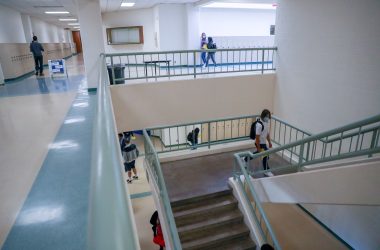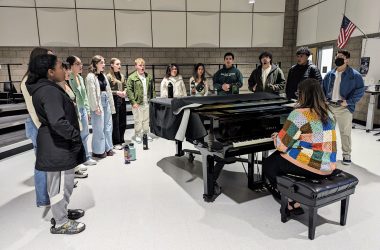
Construction and woodworking teachers Michelle Zielinski, left, and Andrew Chidwick, set up for class on Oct. 23 (Rachel Alexander/Salem Reporter)
Pies to the face.
Ghost stories over Zoom.
A shawl and bright lipstick for a touch of drama.
For three Salem wood shop teachers, it’s all part of class.
As teachers and students across the U.S. have struggled with remote schooling, Andrew Chidwick, Joe Simon and Michelle Zielinski are trying something different.
Though they normally teach at three different high schools, they’ve combined their classes into one, planning more interactive lessons where the teachers play off of each other, mimicking the questions and conversation they’d have from students during in-person classes.
That could mean having Simon demonstrate glue gun safety while Chidwick nails the perfect camera angle and Zielinski monitors the classroom chat, answering student questions.
Or it could mean Chidwick lecturing about architecture, only to be interrupted as Simon takes a phone call from a “client” – Zielinski
, in costume as “Susan Weathers,” a fashionable lady who wants the students to design and build her a new kitchen.
Chidwick is the group’s ringleader and describes the process as “edutainment.”
 Andrew Chidwick laughs while teaching a woodworking class from the North Salem High School shop on Oct. 23. (Rachel Alexander/Salem Reporter)
Andrew Chidwick laughs while teaching a woodworking class from the North Salem High School shop on Oct. 23. (Rachel Alexander/Salem Reporter)
The group teaches about 325 students between the three schools, split into classes of about 50.
A recent lesson began with Chidwick’s floating head visible on an otherwise pitch-black Zoom background as he spun a story in an over-the-top haunted voice. The story became a motivational speech about the importance of completing assignments as students took to the Zoom chat to poke fun
“Pennywise the dancing clown,” one wrote.
Another chimed in, “Chidwick looking kind of sus” – that’s short for “suspect.”
Those comments “are like gold to me,” Chidwick said. A student calling their teacher weird is a student who’s showing up to class and participating – something many high school teachers say is too rare in a world of online school.
While Gov. Kate Brown last week relaxed the Covid targets counties must hit before schools can reopen, Marion County has a long way to go. Nearly all Salem students will be attending class online through at least Feb. 1.
The three teachers said working together this helps them too. It’s common for every student in their classes to attend on Zoom with camera and microphone off – if they show up at all.
Teaching to a wall of black rectangles without the back-and-forth of a traditional classroom is hard. But they can draw the energy they’re not getting from students from each other, whether they’re in the shop at North Salem High School together or calling in from their respective schools.
“We at least have these faces,” Zielinski said, referring to the other teachers. “We’re not a crazy person talking to yourself.”
Having more teachers in class frees one of them up to talk to students on the chat, where teenagers actually like to engage.
 Teachers Joe Simon, left, and Michelle Zielinski discuss an upcoming project for their virtual classes on Oct. 21 (Rachel Alexander/Salem Reporter)
Teachers Joe Simon, left, and Michelle Zielinski discuss an upcoming project for their virtual classes on Oct. 21 (Rachel Alexander/Salem Reporter)
Chidwick said not every lesson works as intended, but students often respond well. Even when the antics are corny, the students realize teachers are putting in effort for them.
“All of a sudden, assignments are being turned in that weren’t being turned in,” he said of the horror story turned motivational speech.
Students appreciate the effort too, much as they might tease the teachers. As one student put it in a mid-October class, “You guys are alive. Most teachers are dead by now.”
Co-teaching woodworking via Zoom was not the plan any of the three had in mind for the fall.
They come from high schools that have sometimes fierce rivalries, and each of their programs is slightly different.
Chidwick teaches cabinetmaking at North Salem. Simon runs the wood and metal fabrication program at South Salem High School. Zielinski teaches construction at McKay High School.
Those programs are among the many career and technical education options in Salem schools, where online teaching is particularly challenging because the classes are designed for hands-on instruction and practice.
As it became clear over the summer that local schools would not be returning to in-person classes in the fall, the trio began discussing what woodworking classes might look like virtually.
“There was definitely a lot of frustration and emotion feeling like, ‘How is this going to happen?’” Chidwick said.
They decided woodworking classes would focus on design, with lessons on architectural style, measurements, drafting and modeling.
 Woodworking teacher Andrew Chidwick, right, films colleague Joe Simon for a live class on Oct. 23 (Rachel Alexander/Salem Reporter)
Woodworking teacher Andrew Chidwick, right, films colleague Joe Simon for a live class on Oct. 23 (Rachel Alexander/Salem Reporter)
In a meeting in Chidwick’s classroom – the newly-remodeled wood shop at North – they discovered all three had the same teaching schedule.
Zielinski said they immediately grabbed an assistant principal who happened to be in the hallway and asked her if they could combine classes. The principal said yes, and administrators from the other two schools quickly agreed, so long as each teacher was responsible for grading and helping their own students.
It’s an experiment, but so far, it’s worked, they said. Early Zoom chats had some students trash talking their rival schools but that dissipated after the teachers made it clear that wouldn’t be tolerated.
By the final week of October, the trio was helping students start work on their final project: building a scale model kitchen using a take-home kit that classroom aides assembled by hand-cutting more than 18,000 sticks of wood.
They introduced the kit in a lesson on Oct. 23, characteristically titled “WHAT’S IN THE KIT?” – a reference to the final scene of serial killer movie “Seven.”
Students were, as usual, in class as black squares, but the classroom chat lit up as the teachers explained how they could pick up the needed items from their schools, all for free.
“0% sales tax? wow,” one wrote.
“in this economy?” another joked.
Simon explained the importance of safety goggles before pulling out the pieces – wood strips, pencils, drafting paper, and the pièce de résistance – a glue gun.
“We had to do a lot of paperwork,” he told the students. The subtext was clear: don’t mess this up for next quarter’s class.
After class finished – the final period for the week – the three stayed in the shop at North and talked briefly about how best to help students stay on track with their at-home project.
All said they’ve been able to teach better because they can rely on the expertise of three people with different backgrounds in construction and woodworking trades.
“We all get to do something more than we could,” Chidwick said.
Correction: This story was updated to correct the spelling of Michelle Zielinski’s last name.
SUPPORT ESSENTIAL REPORTING FOR SALEM – A subscription starts at $5 a month for around-the-clock access to stories and email alerts sent directly to you. Your support matters. Go HERE.
Contact reporter Rachel Alexander: [email protected] or 503-575-1241.

Rachel Alexander is Salem Reporter’s managing editor. She joined Salem Reporter when it was founded in 2018 and covers city news, education, nonprofits and a little bit of everything else. She’s been a journalist in Oregon and Washington for a decade. Outside of work, she’s a skater and board member with Salem’s Cherry City Roller Derby and can often be found with her nose buried in a book.









